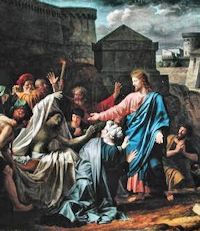
Daily Readings for: June 09, 2013
(Readings on USCCB website)
Collect: O God, from whom all good things come, grant that we, who call on you in our need, may at your prompting discern what is right, and by your guidance do it. Through our Lord Jesus Christ, your Son, who lives and reigns with you in the unity of the Holy Spirit, one God, for ever and ever.
RECIPES
ACTIVITIES
PRAYERS
Ordinary Time: June 9th
Tenth Sunday of Ordinary Time
Old Calendar: Third Sunday after Pentecost
A large crowd from the city was with her.
When the Lord saw her, he was moved with pity for her and said to her, “Do not weep.” He stepped forward and touched the coffin; at this the bearers halted, and he said, “Young man, I tell you, arise!” The dead man sat up and began to speak, and Jesus gave him to his mother. Fear seized them all, and they glorified God, exclaiming, “A great prophet has arisen in our midst, ”
and “God has visited his people.”
Click here for commentary on the readings in the Extraordinary Form of the Roman Rite.
Sunday Readings
The first reading is taken from 1 Kings 17:17:-24 and is about Elijah restoring a widow's son to life by interceding with God.
The second reading is from St. Paul's Letter to the Galatians 1:11-19. The Judaizers were saying that Paul had appointed himself an Apostle, ,and that he did not have the true Gospel. This he now solemnly denies, and insists that what he taught the Galatians was not invented by him or by any other mere man.
The Gospel is from St. Luke 7:11-17. The lesson we have to learn from this story today is the real, sincere compassion which Christ had for the human sufferings of men in this life. He became man in order to bring mankind into heaven. That was the principal motive of his Incarnation. The sorrows and trials of this earthly life are of relatively small importance when compared with the unending future of happiness which is prepared for us if we conduct ourselves, as he has ordained, during our few years on this planet of ours. Knowing our human nature better than we can ever hope to, and knowing how easily we can become entangled in the affairs of this world, and especially how easily sorrows and trials can depress us and make us forget our real goal in life, he has proved to us during his sojourn amongst us that he is interested in our earthly life as well.
Although he is now at the right hand of the Father, his interest in us is just as strong, and as sincere, as it was while he was here on earth. There are Christians who at times feel that they are getting more than their due share of earth's hardships, and that the all-merciful Savior seems to have forgotten or abandoned them. It is not so. We are all inclined to exaggerate our sufferings, to forget the months, the years of health and happiness which we have had. How many of us ever stop to think of the twenty-eight useful, healthy teeth we have had for years, until one or two of them begin to ache and pain? So it is with all the other numerous gifts given us by God.
Our Christian religion teaches us that trials and troubles are a very important part of our training for heaven. But of this we can rest assured : when God sends a cross, he also gives the strength to the one who has to shoulder it. Our part is to turn to the God of compassion and ask him for the grace and the strength to carry out his will. Such a prayer is never left unanswered. He will give us the strength. He will never let us be crushed by the cross which he sends.
We often see very sad cases where the bread-winner of the family is taken, and we may wonder why the good God allows this to happen. If we knew all the facts, however, and if we could read the divine plan, we might see that this very happening was a divine blessing for the departed one and for those left to suffer his loss.
There are divine miracles of healing going on around us today but they are not recognized as such. There are also savings from sudden death, of which those saved are utterly ignorant. It is only when we reach the future life that we shall be able to fully comprehend the divine compassion which regulated our lives from the cradle to the grave.
Be assured, then, that Christ still has compassion for all mankind. Put your trust in that compassion and thank him daily for it. He may not always save a beloved one from an early death, or save us from a long illness (a request we see as all-essential for us, and as a very apt occasion for Christ to prove his compassion), but that fervent request of ours is answered in another way, in a favor of which we had or could not have dreamed at that time.
Thank God each day for his mercies. Ask him daily for his divine compassion. Leave the decision to him who knows what our real needs are.
Excepted from The Sunday Readings, Fr. Kevin O'Sullivan, O.F.M.

